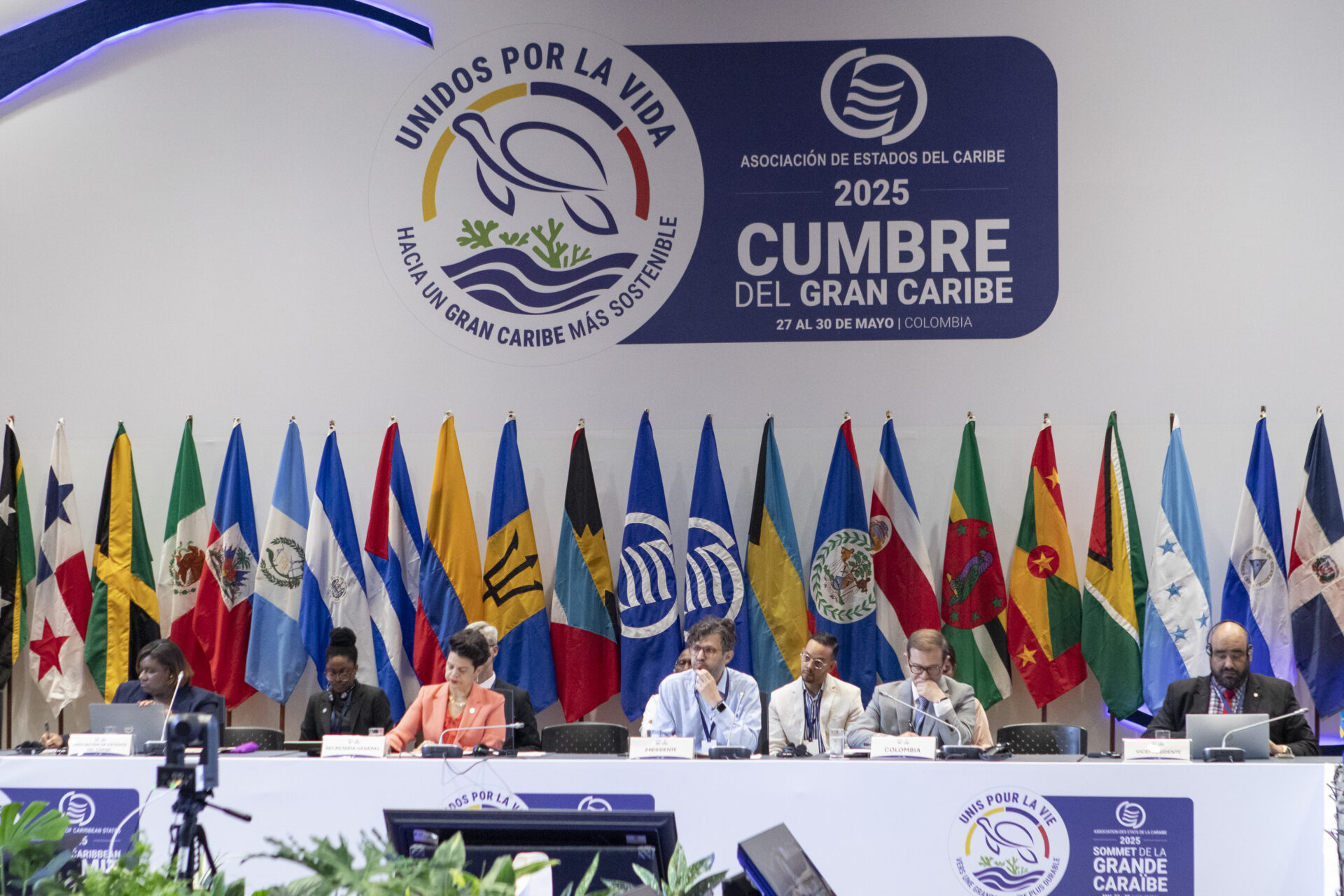Ante una creciente interdependencia global, la región del Gran Caribe enfrenta retos complejos que exigen respuestas colectivas, estratégicas y urgentes. El cambio climático golpea con particular fuerza a los pequeños Estados insulares y a las costas continentales; la inseguridad alimentaria y los desastres naturales amenazan el bienestar de millones; mientras tanto, las desigualdades sociales, la migración forzada y la vulnerabilidad económica continúan profundizando la fragmentación. En este contexto, la necesidad de avanzar hacia una mayor integración regional se convierte no solo en una aspiración política, sino en una necesidad vital.
La fragmentación histórica de la región, marcada por sus múltiples lenguas, sistemas políticos y niveles de desarrollo económico, ha dificultado la construcción de un proyecto común. Sin embargo, los desafíos compartidos —como la adaptación al cambio climático, la gestión del turismo sostenible, el combate al narcotráfico y el impulso al comercio intra-regional— exigen espacios multilaterales más sólidos, flexibles y operativos.
Es precisamente en este escenario que se realiza la Décima Cumbre de Jefes de Estado y de Gobierno de la Asociación de Estados del Caribe (AEC), un evento de gran relevancia que se celebrará del 27 al 30 de mayo en Cartagena y Montería, bajo la presidencia pro tempore de Colombia. La cumbre constituye una oportunidad estratégica para repensar el rol de la AEC, revitalizar sus mecanismos y posicionarla como una plataforma clave de integración en el Gran Caribe.
La AEC fue fundada en 1994, también en Cartagena, como un mecanismo de consulta, concertación y cooperación entre los países y territorios que comparten las costas del Mar Caribe. Hoy, con sede en Puerto España (Trinidad y Tobago), agrupa a 25 Estados miembros y a una decena de miembros asociados, incluyendo a México, Colombia, Venezuela, Centroamérica, las Guyanas y los Estados insulares del Caribe. En conjunto, representa a más de 270 millones de habitantes, una riqueza humana, cultural y ecológica de incalculable valor.
Durante sus tres décadas de existencia, la AEC ha demostrado una notable capacidad de adaptación, flexibilidad y enfoque práctico en torno a ejes temáticos fundamentales: comercio e inversiones, turismo, transporte y gestión del riesgo de desastres. Ha buscado articular intereses diversos en una región marcada por grandes asimetrías, apostando por una cooperación basada en el respeto mutuo y la solidaridad.
No obstante, el mundo ha cambiado. Las amenazas globales —desde las crisis sanitarias hasta las guerras geopolíticas, pasando por los efectos extremos del cambio climático— exigen una renovación profunda de la agenda de trabajo de la AEC. La reciente aprobación del Plan Estratégico 2025-2030 marca un paso positivo en esa dirección, al tiempo que se vislumbra una renovación en su liderazgo con la gestión de la Secretaria General, la embajadora hondureña Noemí Espinoza Madrid, diplomática de carrera con más de treinta años de experiencia.
Entre los temas que deberían ser prioritarios para la asociación destacan el fortalecimiento institucional, la solución de los problemas presupuestarios y administrativos, así como una mejor rendición de cuentas. También resulta clave ampliar la visibilidad del trabajo de la AEC ante la opinión pública regional e internacional, incorporando más activamente a la sociedad civil, la academia y los sectores productivos.
Una propuesta que cobra cada vez más fuerza es alinear los objetivos de la AEC con los Objetivos de Desarrollo Sostenible (ODS) de las Naciones Unidas. Esta integración permitiría un abordaje más holístico y coherente de los retos del Caribe: desde el desarrollo social inclusivo y la erradicación de la pobreza, hasta la transición energética, la transformación digital, la seguridad alimentaria y la justicia climática. Incorporar los ODS a la agenda de la AEC no solo es pertinente, sino esencial.
El lema de la cumbre, “Unidos por la vida: hacia un Gran Caribe más sostenible”, refleja con acierto la vocación integradora que necesita la región. En medio de un orden internacional inestable, marcado por la competencia entre grandes potencias, el autoritarismo emergente en varios países y una creciente incertidumbre económica, el Gran Caribe debe afirmarse como una región de paz, cooperación y sostenibilidad. Esta afirmación debe traducirse en compromisos concretos y acciones efectivas por parte de los gobiernos y de todos los actores relevantes.
La historia del Caribe ha estado marcada por ciclos de dependencia, intervención extranjera y resistencia. Desde la esclavitud hasta la lucha contra el colonialismo, pasando por momentos de cooperación regional, esta región ha sabido encontrar su voz y construir identidades compartidas. Hoy, esa misma historia debe ser fuente de inspiración para impulsar una nueva etapa de integración, una que no se limite a declaraciones políticas, sino que articule acciones conjuntas, instituciones sólidas y una ciudadanía regional activa.
La AEC, con su estructura multilateral y su enfoque inclusivo, tiene el potencial de convertirse en el principal mecanismo de concertación política y técnica del Gran Caribe. Pero para lograrlo, necesita ampliar su base de legitimidad, modernizar su funcionamiento, atraer inversiones estratégicas y consolidar alianzas con organismos internacionales, ONGs y universidades.
En conclusión, la Décima Cumbre de la AEC no debe ser vista como un evento más en el calendario diplomático regional. Es una oportunidad histórica para profundizar la integración del Gran Caribe, renovar el compromiso con el desarrollo sostenible y establecer una hoja de ruta concreta hacia una región más equitativa, resiliente y unida.
Ante un escenario de incertidumbre internacional y reconfiguración sistémica, la integración ya no es una opción; es una necesidad urgente. Solo a través de una cooperación regional reforzada, respetuosa de las diversidades pero enfocada en objetivos comunes, será posible construir un Gran Caribe verdaderamente soberano, democrático y sostenible.











